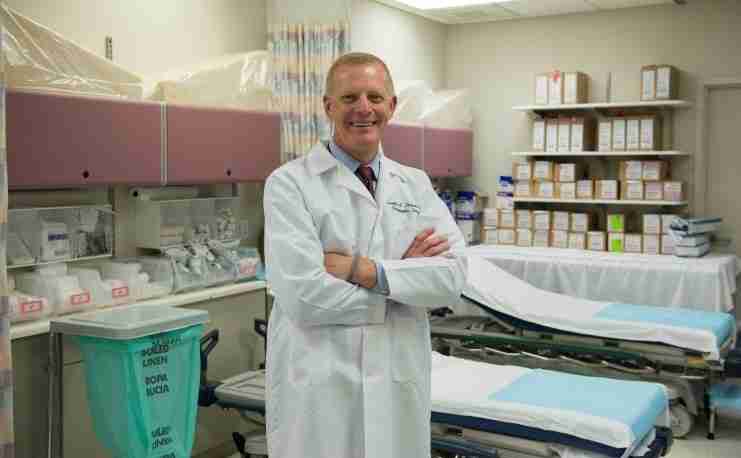Saline wash proves better than soap for open fractures
Sometimes, back-to-basics research yields surprising new findings.
A study published Thursday evening in the New England Journal of Medicine, shows patients who had their open fractures washed with saline fared better than those whose wounds were washed with soap.
The research, led by Mohit Bhandari, MD, PhD, at McMaster University in Ontario, Canada, found that patients who had their wounds washed with sterile castile soap at the start of surgery were 32 percent more likely to need a second surgery than those whose injuries were washed with sterile saline. The clinical trial involved nearly 2,500 patients who were followed for a year at dozens of clinical centers.
Douglas Dirschl, MD, chairman of the Department of Orthopaedic Surgery and Rehabilitation Medicine at the University of Chicago Medicine, reviewed the findings in an accompanying editorial published in the journal. He said the study has the potential to “substantially change” how trauma surgeons care for these sorts of wounds, which he estimates receive a soap cleansing about half the time.
The cleaning, which can involve as much as 12 liters of fluid to flush out dirt, debris and dead tissue, is a critical procedure that takes place before trauma surgeons begin to repair serious fractures.
“It gives us a definitive answer on something that’s been debated for a long time,” he said. “Debridement and irrigation is the absolute first step in a long chain of steps that constitute the management and treatment plan for these fractures. Doing the best possible thing at the first step is critically important. If you don’t, then things tend to escalate.”
Dirschl said the research is the “most substantial contribution to medical knowledge in these areas to date.” Previous studies involved smaller trials or only looked at outcomes in the first few weeks following surgery – for instance, whether a wound healed properly or became infected.
But long-term effectiveness is more important to patients, Dirschl said. And it’s also increasingly on the minds of health care organizations that are working to lower medical costs.
“This is the first study that’s been done with enough power and with enough patients to really answer the question,” Dirschl said.
The debate about the best way to care for gaping wounds is as old as Hippocrates, an ancient Greek physician who’s often called the father of modern medicine. Until after the American Civil War, many of these injuries were treated by amputation. (Roughly half of patients whose limbs were amputated contracted sepsis and died.) Later, surgeons began using antiseptics during debridement. And by the 1990s, research suggested doctors use gentle castile soap to wash the areas because antibiotics could cause allergic reactions or be toxic to delicate tissues.
But Thursday’s study shows how important it is to question long-held assumptions about what could be considered fundamental practices.
“In medicine, we’ve been so focused on technological advances that we sometimes didn’t take the time to do a robust study on simple little things,” Dirschl said. “It was just much more attractive to do a study about the latest, high-tech way of managing something rather than studying the right way to clean an open wound.”
